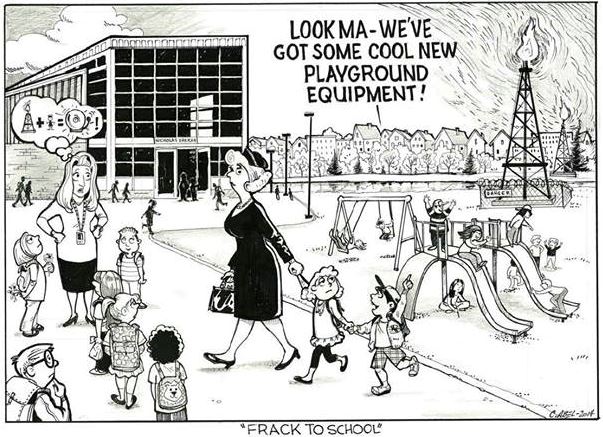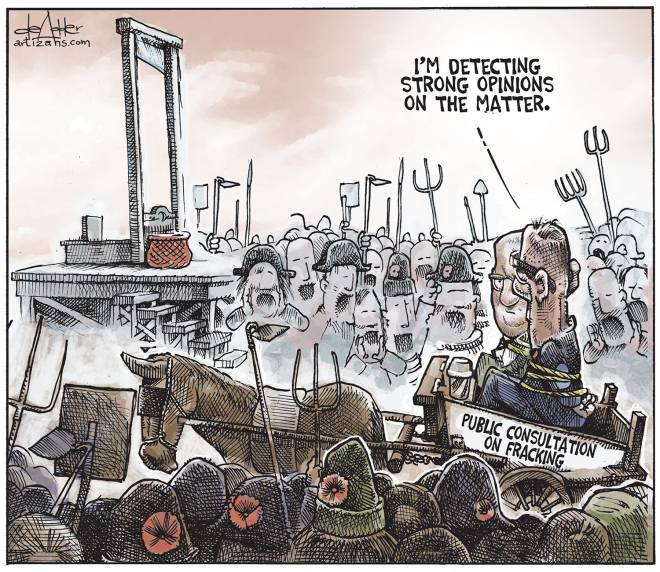Nova Scotia still working on rules for possibility of fracking, with stakeholders demanding a say by Michael Gorman, February 6, 2015, Chronicle Herald
Acting energy minister Michel Samson said in a recent interview that department staff are still at work on the regulations, which will include a definition of high-volume hydraulic fracturing. [Why did Dr. David Wheeler, Dr. Maurice Dusseault, et al on their frac panel and now the government waste so much time defining what energy regulators and companies defined years ago? To create a new definition that allows this?
 “We’re looking at jurisdictions that have had experience with this in order to find the best possible definition, best possible regulations [TO BENEFIT INDUSTRY THE WAY THE “BEST IN THE WORLD” AER DOES IN ALBERTA?] and, as has already been committed, once that’s put in place there will be a 30-day consultation period with Nova Scotians before the final regulations are implemented,” Samson said.
“We’re looking at jurisdictions that have had experience with this in order to find the best possible definition, best possible regulations [TO BENEFIT INDUSTRY THE WAY THE “BEST IN THE WORLD” AER DOES IN ALBERTA?] and, as has already been committed, once that’s put in place there will be a 30-day consultation period with Nova Scotians before the final regulations are implemented,” Samson said.
But people with a keen interest in exactly what those regulations will say want to be involved in the actual drafting process. [The actual drafting part of the process is the only place communities and families to be harmed have any voice, that is why governments the world over leave them out]
“I think it’s pretty clear that this issue is one of very intense public debate,” said Catherine Abreu of the Ecology Action Centre in Halifax.
“Organizations that are really deeply involved in this issue just being relegated to that typical 30 days for public comment is not appropriate in this instance.”
Abreu said she didn’t think there was enough involvement for stakeholders during the drafting of the legislation, introduced in November, but she was willing to get over it given how quickly government turned the bill around following the release of the Wheeler report.
She was willing to get over it in part because she expected her group and others would at least be consulted in the drafting of the regulations for hydraulic fracturing. [WHEN WILL THE DAY COME WHEN NGO’s, COMMUNITIES, INDIVIDIUALS THAT WANT TO KEEP FRACING OUT LOOK TO THE TRICKS USED EVERYWHERE THE INDUSTRY IS FRACING AND REGULATORS/GOVERNMENTS ARE DEREGULATING TO ENABLE THE HEALTH HARMS AND POLLUTION?] “So far that doesn’t really seem to be happening,” she said. [OF COURSE NOT! IT NEVER DOES, ANYWHERE, NO MATTER WHAT THE GOVERNMENT, INDUSTRY OR REGULATORS PROMISE. If citizens and communities about to be harmed are involved in drafting the “Best Possible” regulations they would see the endless betrayals and deregulation to allow unaccountable, unenforceable, voluntary “Best Practices” created by industry to ensure maximum profit taking while legalizing the poisonings and health harms. Why would governments and industry include communities and people that don’t want to be poisoned and harmed by fracing and watch frac induced earth quakes destroy their homes, businesses and community paid infrastructure?]

Darren Zwicker, secretary for the board of the Maritime Energy Association and general manager of the Atlantic division of Newalta, said the association also wants to be consulted on the regulations and so far it hasn’t heard from government either. [BECAUSE INDUSTRY IS CREATING THE REGULATIONS? No need to be consulted if you make the rules for government]
[Refer also to:
It was suggested that a new regulatory framework may be beneficial, and that regulators could consider a “blanket approach” to approve drilling programs for this type of development. [Emphasis added]
2015 01 05: Fracking-induced earthquake puts B.C. gas bonanza on shaky ground
The small town of Fox Creek in northern Alberta may have broken the world’s ‘fracking earthquake’ record with the 4.4-magnitude shaker that hit last month. The most probable cause, according to Alberta’s energy regulator, was nearby gas fracking operations. The recent quake was on many people’s mind as they listened to a presentation in Ottawa on the shale gas “bonanza” happening across North America today.
“There seems to be a link between the volume of water [used in fracking] and seismic activity,” Denis Lavoie, a research scientist with the Geological Survey of Canada (GSC) told an audience of parliamentarians, experts and the general public in Ottawa during a presentation yesterday.
The talk was part of the ‘Bacon & Eggheads’ monthly morning lecture series put on by the Partnership Group for Science and Engineering (PAGSE) at Parliament’s Centre Block.
In his presentation, The Shale Gas Bonanza: Opportunities and Challenges, Lavoie confirmed fracking operations in British Columbia and Alberta have been “known to cause small seismic events.” Lavoie believes the vast quantities of water industry injects into the ground is the “most likely candidate” for increasing the frequency and intensity of earthquakes in areas near fracking wells. …
When asked by Alberta MP Leon Benoit whether this seismic activity was problematic, Lavoie said earthquakes connected to Canadian fracking operations have not reached a magnitude yet where they could cause damage on the surface. Magnitudes of five and upwards can cause damage, according to Lavoie. [Sounds like a staged question to put Canadians back to sleep. Is Lavoie telling a “No Duty of Care” fib?] …
“Assessing the environmental challenges to development is prerequisite to the social license,” Lavoie said. [Then why are all Canadian environmental and health agencies, nearly all academics, Canadian Council of Ministers of the Environment, and the Council of Canadian Academies refusing to assess and monitor the environmental damages and health harms, and recommending the opposite: “Frac slowly and study as you go?” And why did Health Canada not release their 2012 frac report to Canadians? To keep the risks secret?]
Many of the other pressing “environmental challenges” that have come to light through a decade of fracking in B.C. and Alberta were not addressed in detail during the presentation.
Lavoie did state there was a definite need to collect baseline data before shale gas development takes place, echoing the findings of the Council of Canadian Academies (CCA) in 2014:
“There is reason to believe that shale gas development poses a risk to water resources, but the extent of that risk, and whether substantial damage has already occurred, cannot be assessed because of a lack of scientific data and understanding,” the report concluded. The report was commissioned and released by Environment Canada on May 1, 2014.
B.C. only has 10 monitoring stations overseeing the operations of thousands of fracking wells.
Fracking would help Nova Scotia retain young workers: Kenney by The Canadian Press, February 7, 2015, The Chronicle Herald
Young Nova Scotians are contributing to Alberta’s prosperity when there are energy resources that could be tapped into at home that would lead to jobs, the federal minister of employment and social development said Saturday.
“I’m from Alberta,” Jason Kenney told a meeting of the provincial Progressive Conservative party. “I see all of these wonderful young Nova Scotians who’ve come down there to work hard and make good money and, heaven forbid, you know what they’re doing? They’re drilling for oil and gas. They’re actually drilling fracking wells.”
[Reality Check:
2014: Confessions of an Oil and Gas Worker: I live in Heaven, but I work in Hell… ]
Nova Scotia introduced legislation last fall banning high-volume hydraulic fracturing for onshore oil and gas. The province already had a moratorium on the practice, also known as fracking, for two years before putting the ban into legislation.
Provincial Progressive Conservative Leader Jamie Baillie has said he does not support the ban, adding that it prevents the creation of new jobs in the province.
When the legislation was introduced, Energy Minister Andrew Younger said the province would not look at lifting the ban without evidence that fracking can be done safely under new rules and regulations.
Nova Scotia is not alone in Atlantic Canada in its stance on fracking.
New Brunswick introduced its own moratorium in December that Premier Brian Gallant said will not be lifted until concerns the province has on health, water and the environment are dealt with. The province is also promising to get input from First Nations on fracking. …
In Newfoundland and Labrador, fracking is temporarily banned while a[not so] independent panel [Dr. Maurice Dusseault, on the panel, was issued a frac patent in 2013] reviews the issue. P.E.I. is waiting for the results of studies in other jurisdictions before it takes a position on fracking.
Kenney said fracking in the western provinces is done safely. [Emphasis added]
